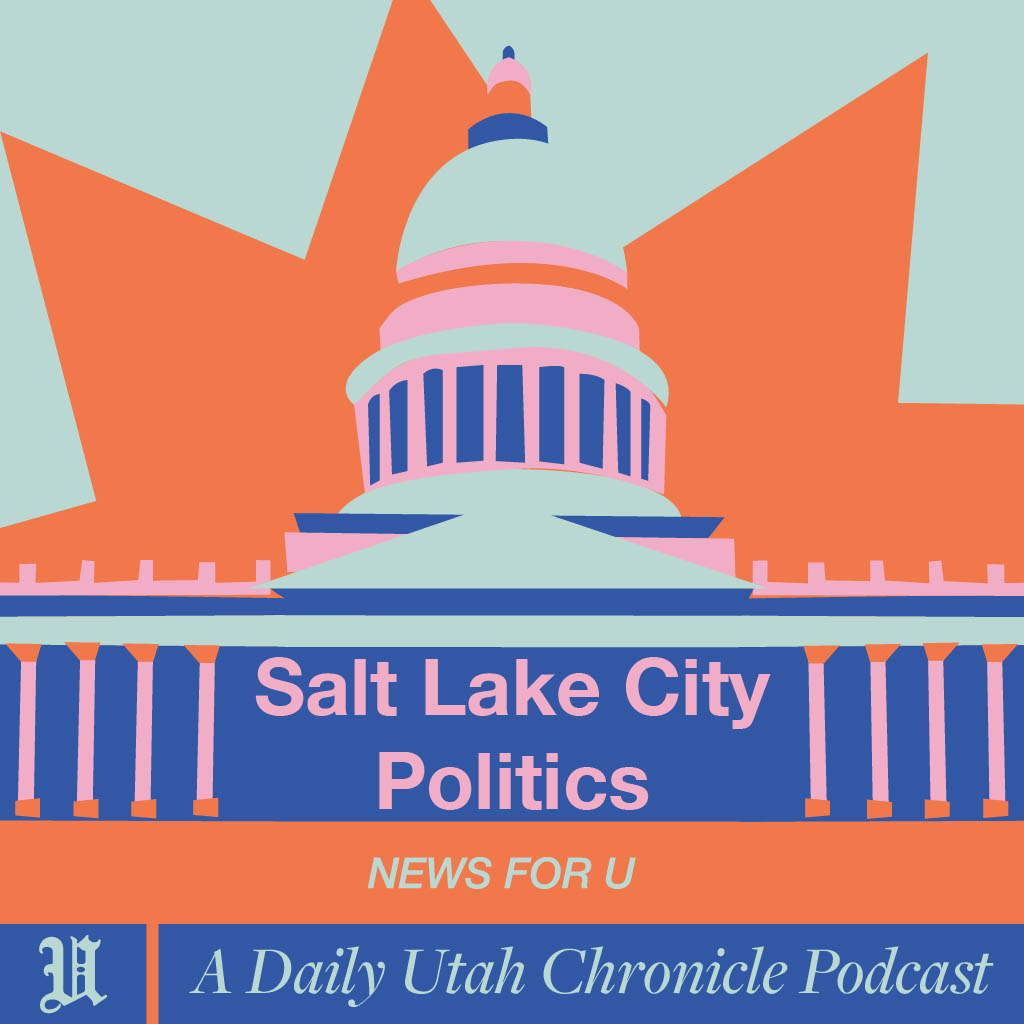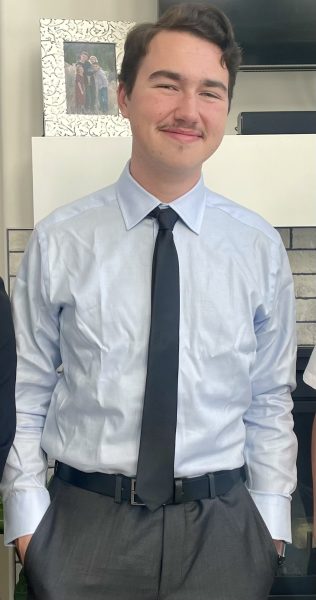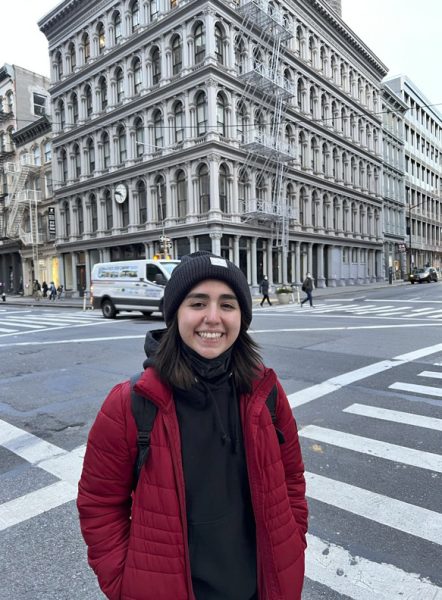In today’s episode, Emma speaks with Assistant News Editor Vanessa Hudson and Online Managing Editor Andrew Christiansen about SLC’s upcoming mayoral election and the issues currently facing the city. You can read the full story here.
Transcript
Emma Ratkovic: Hello and welcome back to News For U. I’m your host Emma Ratkovik, joined with our producer Graham Jones. The mayoral elections are coming up in the next few weeks. The candidates are Erin Mendenhall, Rocky Anderson and Michael Valentine. In the debate on Oct. 4, they discuss topics ranging from their opinions on how the city should approach homelessness and housing affordability. They also mentioned the state-led initiative to extend I-15 through the north side of town. Mendenhall has emerged as the top donor despite the lack of public polling on the mayoral contenders. According to campaign finance reports, the incumbent raised $480,000 in total contributions, while Anderson raised only $231,000 and over that time, Valentine raised $2,000. Andrew Christiansen and Vanessa Hudson recently covered the mayoral debate on Oct. 4. Hi, Andrew and Vanessa, thank you so much for joining us today in the podcast. Do you want to introduce yourself and explain what you do for the Chrony?
Andrew Christiansen: Yeah, I’ll go first. My name is Andrew, I’m the online managing editor for The Daily Utah Chronicle. So basically, I’m the last person who looks at online stories and actually publishes them on the website and I’ve been at the Chrony for over a year now.
Vanessa Hudson: Hi, thanks for having me. I’m Vanessa. I’m the assistant news editor for The Chronicle. So I help our news editor Cael out with everything, and I also double as a news writer sometimes, like in this case, and I have been with the Chronicle for almost three years now, which is insane to me, but yeah.
Emma Ratkovic: Awesome. Thank you guys so much for joining us. So one of the biggest topics covered in the debate was the need for more affordable housing in the Salt Lake area. The three candidates clashed on the subject. How did their approaches to these issues differ?
Andrew Christiansen: Yeah, I think it’s it’s pretty clear if you’ve watched any of the Salt Lake City mayoral debates so far that affordable housing is one of the most important issues to all three of them. Senior Analysts at the University of Utah’s Kem C. Gardner Policy Institute now say housing is severely unaffordable in Utah, and that homes and rentals are the least accessible for average wage earners in state history with the next several years likely to offer little relief. So first of all Rocky Anderson, who was the mayor of Salt Lake City from 2000 to 2008, has criticized Mendenhall throughout the campaign trail for her approach to affordable housing. Rocky kind of wants to make a shift to non-market housing, which is different than any of the other candidates’ approaches. This would mean that the city would see affordable housing more as a public good like its libraries and streets.
Vanessa Hudson: And Mayor Mendenhall claimed that Anderson’s approach to affordable housing would cost much more money than her administration’s approach. In the time that she’s been mayor since 2020, she said city investments have helped create more than 4,000 affordable housing units, and that marks a 413% increase in affordable housing unit creation, and Michael Valentine, who also happens to be the only candidate who rents, said the city is quote, “…taking public money through the Redevelopment Agency, subsidizing luxury housing, calling it affordable housing when it actually isn’t.”
Emma Ratkovic: According to your article, Utah was ranked 45th in the nation for affordable housing in February 2023. What does this figure indicate for Utah’s future?
Andrew Christiansen: Yeah, when I found this statistic, it was it was pretty concerning to me. And I think anyone who hears that, it’s just like, wow, 45th in the country, like I knew affordable housing wasn’t great in Utah, but I didn’t know it was that bad, and the unfortunate thing is that the need for affordable housing specifically for renters is likely to continue to grow in the state in the coming years and that’s because of the high cost of home ownership, rising rental rates and historically low vacancy rates. And that’s according to a 2023 Kem C. Gardner Policy Institute study. The one positive is that the state has gotten more directly involved in funding. The solutions to providing more affordable housing in recent years, the 2023 legislative session ranks as the most productive for housing assistance ever.
Emma Ratkovic: Interesting. The population of Salt Lake City has increased by around 20,000 over the past 20 years. And Mendenhall brought up the intriguing fact that the city now has a majority of renters. Why do you think that this is the case, according to your research?
Andrew Christiansen: Yeah, I found that interesting too, but I think it makes sense when you think about it, because the median listing home price in Salt Lake last month was $590,000. So I think anyone hearing that number, that sounds like way too much money to afford and I think it’s become a reality for a lot of people our age to have like, it’s just not going to be a possibility to afford a house and so you’re kind of just forced into a position to rent and I think that’s the case for a lot of people our age and even older too. So yeah, and you know, we’ve seen in recent years housing prices increase to record levels throughout the COVID-19 pandemic — so much so that about 70% of Utah households were priced out of the median-priced home by the spring of 2022. Luckily, housing prices have decreased some since then, but you know, as you heard that median price, they’re still not cheap at all.
Emma Ratkovic: Homelessness is a growing problem in Salt Lake City. Valentine shared his personal experience with homelessness and how he plans to address the rising issue. Can you describe his experience with homelessness and what he wants to do to fix the issue?
Vanessa Hudson: So throughout the debate, Michael Valentine mentioned frequently that he had experienced homelessness, and he feels like this sets him apart from the other candidates. In terms of fixing the issue, his plan is to declare a state of emergency and have a lot of sanctioned camping. His main goal is just to get everyone into housing as soon as possible.
Emma Ratkovic: Can you describe the pod structure that will serve as a temporary shelter community? What does this look like? And how will unhoused individuals benefit from this?
Vanessa Hudson: For sure, so this temporary shelter community, it’s an effort done by Mayor Mendenhall and the city. So there’ll be 50 pods in this temporary shelter community and the community will be at 300 S and 600 W. The pods will kind of be like tiny homes — so four walls, and then they’ll have heating and cooling units inside. And this is more of a starting point when it comes to addressing homelessness. It’s kind of like a trial-and-error moment for the city. Obviously, 50 isn’t a big number in comparison to the thousands of people who experience homelessness every year. And that number has only increased. So, it’s a pilot program that Mayor Mendenhall is conducting just to see if they can get more of these types of communities in the future.
Emma Ratkovic: And how did each of these candidates’ thoughts and opinions on homelessness differ from one another? And what approaches do they want to take to combat the issue?
Andrew Christiansen: Yeah, I think similar to affordable housing, I think all of them agree on one thing – that homelessness is a huge problem in Salt Lake City, and I think they would all agree that there’s a homelessness crisis in Salt Lake. According to a 2023 state report, the homeless population has increased every year for the past several years. Mendenhall has launched this temporary shelter community program, but Rocky Anderson has been very critical of the Mendenhall administration, and Anderson said success is getting people into housing and making the city safe for families and businesses. He said downtown wasn’t safe for the community anymore, so that’s been a big focus of, I guess, his concern and why he feels like more steps need to be taken to address the issue.
Vanessa Hudson: And to add on for Michael Valentine, homelessness is obviously a very personal issue for him, but success is nobody on the streets anymore. He thinks Salt Lake could be the first city to completely eradicate homelessness and he also wants to connect people with resources not only for housing but for treatment. And Mendenhall, she — of course — she agrees that, you know, there needs to be more shelters, there needs to be more housing. But she highlighted that a lot of that work needs to be happening on a state level, a.k.a. the Utah State Legislature.
Emma Ratkovic: You mentioned in your story that Utah no longer uses primaries and instead uses ranked-choice voting. What is ranked choice voting and why did the state of Utah make this change? And how do you think this change will influence voting in Utah?
Andrew Christiansen: Yeah, I guess just first, to be clear, not all Utah elections use ranked choice voting, it’s more of a recent thing, but a number of Utah’s local races for this year’s election will be using it. First thing to know about rank-choice voting is it can only be used for elections with more than two candidates — and normally, you know, for a regular election, when you sit down with your ballot and you look at the race, you simply pick your favorite candidate and you’re done, but with rank choice voting, you are instead asked to take all the candidates and order them from your favorite to least favorite. If a candidate wins a majority of first preference votes, they are of course declared the winner. If no candidate wins a majority of first preference votes, the candidate with the least amount of first preference votes is eliminated from the race. First preference votes cast for the failed candidate are then eliminated, and instead, those votes go towards the second choice. At this point, a new tally is conducted to determine whether any candidate has won a majority of the adjusted votes. The process is repeated until a candidate wins and outright majority. It’s kind of confusing to explain, but I think it is a more kind of effective system overall for elections and definitely something that we’ll probably see more of in the future.
Emma Ratkovic: What are some important dates regarding the mayoral election that voters should keep in mind?
Vanessa Hudson: So, mail-in ballots are going to start rolling out on Oct. 30. Early voting starts on Nov. 7, and it’s going to last through Nov. 17. The deadline to vote and the general election is Nov. 13 and then the general election is Tuesday, Nov. 21.
Emma Ratkovic: Who’s the front-runner to be the next mayor, according to your data and your findings?
Vanessa Hudson: It’s really hard to say because, you know, with a lot of state or national elections, you have polling, you have pundits — you have people kind of telling voters who’s ahead and who is losing. But we haven’t found any polling for this race and with that being said, a lot of times the incumbent wins, which would be Mendenhall, but older voters might find that they resonate with Rocky because he was the mayor of Salt Lake City from 2000-2008. From our perspective, it doesn’t really seem likely that someone like Valentine could win. He just doesn’t have as much political experience, which automatically hurts his chances, and he’s on the younger side. He’s a millennial, and we can also look at donor numbers. Since our article has published, they’ve raised a lot more money. So Mendenhall has raised close to $500,000, Rocky’s raised over $230,000, and Valentine has raised around $2,000.
Emma Ratkovic: Do you guys have any final thoughts or comments?
Vanessa Hudson: I think everybody should go out and vote. I think it’s, you know, the number one thing you can do as a citizen of the United States of America, and a lot of people will say, “Oh, well, you know, my vote, maybe my vote doesn’t count in a red state like Utah,” but especially in municipal elections — in these, you know, what you might consider, like lower-skill elections — that is when your vote can matter the most because you are given an opportunity, you know, within your smaller district or whatever to you know, give your vote. And I think sometimes it comes down to one or two votes in some of these smaller elections.
Andrew Christiansen: Yeah no, I totally agree with that and I think that’s where your vote can actually count was when you’re, you know, getting involved in local elections and even just, just personally, in the last couple of years, I’ve been like, since I’ve been able to vote, I’ve voted in every election and like, it’s a lot more fulfilling than, you know, with national elections, you know, you just don’t have as much of an influence. But I think it takes more initiative. You know, you have to get involved, you have to talk to people. And you know, watch the debates that maybe not as many people, you know, are talking about on social media and stuff, but it’s a lot more fulfilling, because you can make a difference, actually, and can see the changes that will be implemented, or at least a promise to be implemented within your city and the community that you live in.
Emma Ratkovic: All right, thank you so much for joining us on the podcast today, Andrew and Vanessa.
Vanessa Hudson: Thanks for having us.
Andrew Christiansen: Yeah, I appreciate it.
Emma Ratkovic: And thank you so much for tuning into this week’s episode of News for U. I’m Emma and make sure to watch out for a new episode in the next few weeks on the state of Utah’s upcoming legislative session.
Transcribed by https://otter.ai
Producer: Graham Jones — [email protected] | @grahamcool8
Host: Emma Ratkovic — [email protected] | @eratkovic_news
Guest: Andrew Christiansen — [email protected] | @andrewwriter01
Guest: Vanessa Hudson — [email protected] |@vanessamwrites





